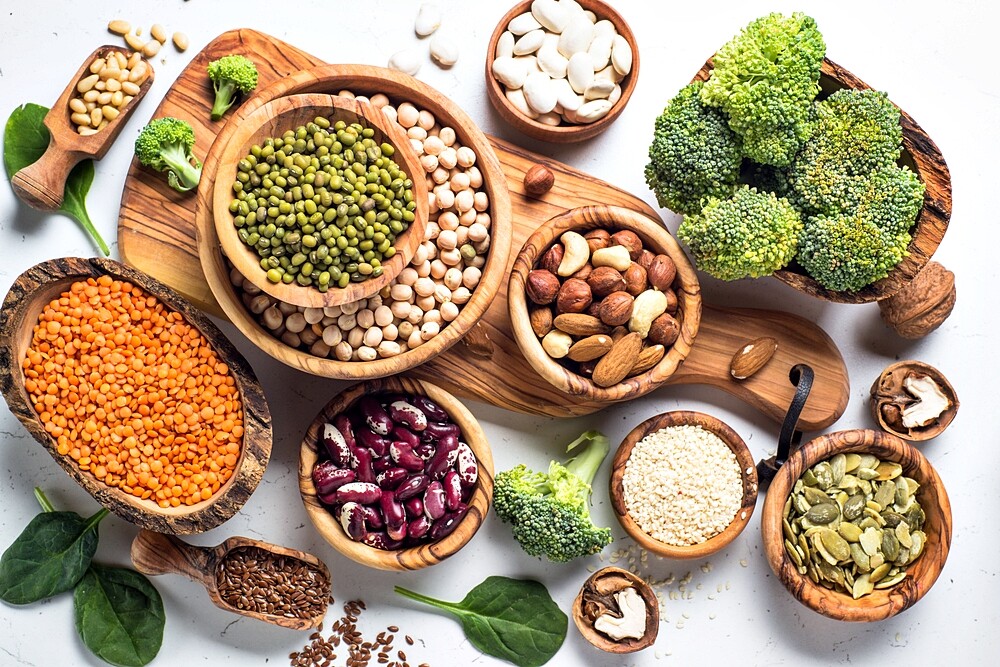People who eat vegetarian or vegan food often hear this question. Even without meat, protein-rich nutrition is no problem at all, as long as you keep a few things in mind.
Proteins are currently the celebrated stars among nutrients, and there are several reasons for this. Proteins are true multi-talents: We need them as building materials to build up muscles, hair, nails, hormones and enzymes in the body, for example. In addition, they are satiating for a long time. According to bestselling author Bas Kast (“The Nutrition Compass“), this is due to the protein effect: “We always eat until our protein requirements are met. That’s why we can eat chips and jelly babies without end, but we’re stuffed after one scrambled egg. In addition, and this is the third advantage, up to 25 percent of the calories are lost when protein is broken down into its components, the amino acids – a practical side effect if you want to lose weight.
Clever combination: This is how it works
So everything’s good, then? Yes and no. We actually consume enough protein, more than the 0.8 grams per kilogram of body weight recommended by the German Society for Nutrition. But this is mainly due to the high consumption of meat, because meat and fish are real protein bombs: 100 grams of chicken breast can provide a good 22 grams of protein – almost half of the daily requirement of a woman weighing 60 kilos. However, women in particular are increasingly eating little or no meat at all, or even do without animal products altogether in order to protect livestock and the climate. And then, unfortunately, things get a bit more complicated.
Basically, it is like this: animal and plant proteins are utilized differently by the body. This is mainly due to the content of the nine essential amino acids such as lysine or methionine. These are the protein building blocks that our body cannot build itself. Just like vitamins, we have to take them in with food, because we need them so badly.
The problem is that if even one single essential amino acid is present in too small a quantity, the others are not used to build up protein either and are converted into fats or sugar instead. Animal protein from eggs, milk, chicken breast and co. has a clear advantage here, because it contains more essential amino acids and can be better utilized by us. Vegetable foods, on the other hand, are often incomplete. Many types of grain, for example, contain very little lysine. Pulses or soya are good suppliers, but they lack the important methionine.
Especially for vegans, the solution is therefore to combine them intelligently. For example, if soya is eaten together with cereals, it contributes the missing methionine. Relatively good amino acid patterns are also found in lupines, chia seeds, spirulina algae or soy products such as tempeh. In order to be able to better evaluate the quality of protein, there is the biological valence: This is a kind of ranking of how much of the protein taken in is converted into the body’s own protein.
Why is vegetable protein so much healthier?
A chicken egg, for example, is considered to be of extremely high biological quality and has a reference value of 100 – because egg protein is very similar to human protein and contains many essential amino acids. But: Together with potatoes, for example in a farmer’s breakfast, the biological value can be increased to 136. This is because the different amino acid profiles of the two foods complement each other quite ideally, although potatoes as a whole contain very little protein.
However, it is somewhat more difficult to achieve these values with a purely vegan diet. Good plant teams are for example combinations of soy products or lentils with quinoa or rice, then the biological value increases. Soy schnitzel and wholemeal rice have a value of 111, and rice with chickpeas or wholemeal pasta with lentils and wholemeal bread with hummus also go well together.
Experts agree that a balanced diet is also sufficient for vegans to be well supplied with protein. However, it can become critical for fast food fans – and if fruit or white flour products are the main source of nutrition. And another piece of good news for meat despisers: there is a second difference – and this time the plant protein wins. This is because the green stuff contains lots of vitamins and health-promoting substances that have a positive effect on our intestinal bacteria and heart health.
This is mainly due to one substance: “Plant proteins are almost exclusively absorbed together with healthy dietary fibres, such as in legumes, wholemeal products, leafy vegetables, tofu, seeds and nuts,” says Prof. Andreas Michalsen from the Berlin Charité hospital. “Animal protein, on the other hand, if it does not come from organic meat, we always eat it together with many saturated fats. This is the essential key to the secret of why vegetable protein is so much healthier”.
Good to know
If you want to be sufficiently supplied with protein, it is best to spread your intake over three to four portions throughout the day, because the body cannot use more than 30 grams at once!

